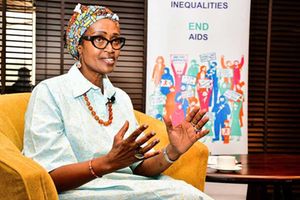Ministry to hire 90,000 health workers for HIV awareness campaigns

Health Cabinet Secretary Susan Nakhumicha.
What you need to know:
- Recent data show that 42 per cent of new HIV cases in Kenya occur among adolescents and young adults aged between 15 and 29.
- Interventions should include empowering young people economically through targeted social protection nets, keeping adolescents in education, and addressing mental health struggles and substance abuse.
The government plans to hire 90,000 health workers and deploy them at the grassroots to sensitise young people on HIV/Aids threats following a rise in infection among them, Health CS Susan Nakhumicha has disclosed.
Recent data show that 42 per cent of new HIV cases in Kenya occur among adolescents and young adults aged between 15 and 29. Speaking on the sidelines of the recently ended African Union Summit 2023 in Addis Ababa, Ethiopia, the CS highlighted that as biomedical interventions are optimised, there is need for collaboration to address structural vulnerabilities and inequalities that sustain infection and impede progress.
“[Interventions should include] empowering young people economically through targeted social protection nets, keeping adolescents in education, and addressing mental health struggles and substance abuse.
“In Kenya, we now have the Hustler Fund, which targets the youth and in just two months we have on board over 18 million adolescents,” she said.
The CS spoke during the joint African Union Development Agency - Pepfar briefing commemorating 20 years of partnership to end HIV/Aids as a public health threat in Africa and across the globe. She pointed out that Pepfar’s partnership has helped Kenya realise a 68 per cent reduction in HIV infection among adults, from a high of 75,000 new cases in 2010 to 32,000 in 2021.
“Mother-to-child infection has declined from a double digit of 16 per cent in 2013 to a single digit of 8.3 per cent in 2022. Aids-related mortality has reduced by 58 per cent from over 50,000 in 2010 to 19,000 in 2020,” she said, highlighting that Kenya has so far averted over two million HIV-related deaths. “And enlisting and maintaining about 1.2 million people living with HIV on lifesaving antiretroviral treatment (ARVs) has been achieved through the support of Pepfar.
“Ending Aids in children requires a ‘bottom-up’ approach, which recognises the power of citizens to create and be part of the change we want in a sustainable manner. Child HIV deaths are largely due to delay in diagnosis, tuberculosis and malnutrition, which we can prevent if we work with communities,” said the CS.
Speaking to Healthy Nation in an interview, CS Nakhumicha ruled out the possibility of allowing young people access to contraceptives, saying they must be taught to abstain. “I am ‘mama kanisa’ (a church woman); we have to teach our adolescents to abstain. I believe that with a strong Christian foundation, they will learn abstinence.”
A fortnight ago, United Nations Programme on HIV/Aids Executive Director Winnie Byanyima said in an exclusive interview with the Nation that it is time Kenya allowed teenagers to access contraceptives. She further noted that inequalities and injustices in our societies are driving the Aids pandemic on and making specific groups of people, such as young women and adolescent girls, highly vulnerable to infection.
In April 2001, heads of state and governments of the Organisation of African Unity (OAU), the precursor of the AU, met in Abuja, Nigeria, following growing concerns about the state of HIV/Aids on the continent.
The ‘Abuja Declaration on HIV/Aids, Tuberculosis and other Related Infectious Diseases’ resulted from that momentous convening and recognised Aids as a “state of emergency” in Africa. The meeting and the Abuja Declaration represent an important milestone, where Africa committed to fighting the virus through a comprehensive multisectoral approach, including partnerships.
UNAIDS HIV treatment seeks to ensure 95 per cent of the population know their HIV status, 95 per cent of people living with HIV are on treatment, and 95 per cent of the people on treatment are virally suppressed. Despite a growing number of African nations achieving or on track to achieve the goal, the pandemic is still a threat to health, security and development.
The pandemic is causing a decline in key indicators of human development, hence reversing the socioeconomic gains that African countries have attained. Development is further impacted by the inequities resulting from HIV/Aids, leading to poverty and underdevelopment. The virus challenges human security and development by reducing the potential to alleviate poverty and hunger, achieve universal primary education, promote gender equality, reduce child and maternal mortality, hamper productivity, and ensure environmental sustainability.
The African Union Development Agency-Nepad (Auda-Nepad), in partnership with Pepfar, is fighting HIV/Aids as part of its effort to achieve a sustainable development path. “The Covid-19 pandemic has taught us that strengthening health systems, production and distribution capacities for medicine and vaccines, as well as building multi-sectoral capacities for preparedness, response and holistic approach to future health and other inevitable shocks, is mandatory,” Ms Nardos Bekele-Thomas, CEO of Auda-Nepad reminded.





